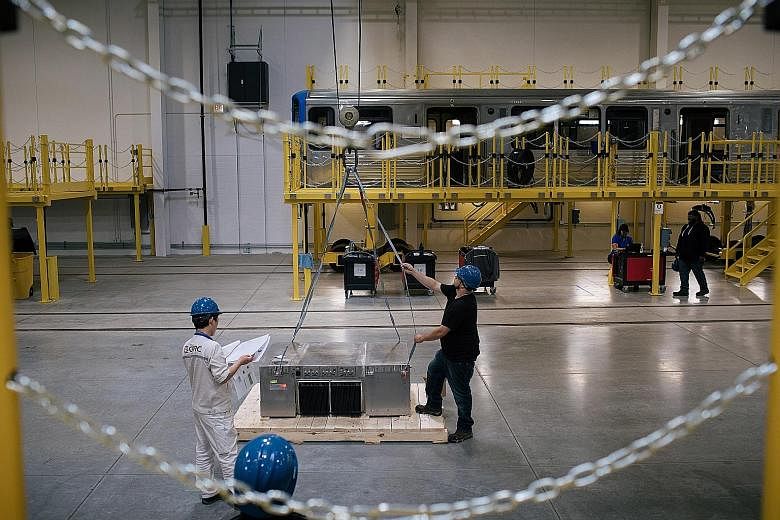CHICAGO • America's next fight with China is unfolding at a glistening new factory in Chicago that stands empty except for the shells of two subway cars and space for future business that is unlikely to come.
A Chinese state-owned company called CRRC Corp, the world's largest train maker, completed the US$100 million (S$137 million) facility this year in the hope of winning contracts to build subway cars and other passenger trains for American cities.
But growing fears about China's economic ambitions and its potential to track and spy on Americans are about to quash those plans.
Congress is expected to approve legislation soon that would effectively bar the company from competing for new contracts in the United States, citing national security and economic concerns. The White House has expressed its support for the effort.
Washington's attempt to block a Chinese company from selling train cars inside America is the latest escalation in a trade war that has quickly expanded from a spat over tariffs and intellectual property to a broader fight over economic and national security.
US President Donald Trump and lawmakers from both parties are increasingly anxious about the economic and technological ambitions of China, which has built cutting-edge global industries, including those that produce advanced surveillance technology. Those fears have prompted Washington to take an expansive view of potential risks.
In addition to slapping tariffs on US$360 billion worth of Chinese products, the administration has banned Chinese companies such as telecommunications giant Huawei from buying sensitive US technology. It is moving to curb the ability of firms to export technology like artificial intelligence and quantum computing from the US to China. And Congress has given the administration expansive power to block Chinese investments on national security grounds.
Now lawmakers have added a provision to a military spending Bill that would prevent the use of federal grants to buy subway trains from state-owned companies, a measure that would effectively block CRRC's business.
Part of the concern is economic: China has pumped money into building globally competitive businesses, often creating overcapacity in markets like steel, solar panels and trains. That has lowered prices for consumers, raising concerns among US freight train companies that CRRC could ultimately move into their business.
The company has consistently underbid its competitors, winning over urban transit agencies saddled with ageing infrastructure and tight budgets. For the Chicago L, CRRC's Chicago subsidiary bid US$1.55 million a car, compared with a bid of US$1.82 million a car by Canadian manufacturer Bombardier. CRRC also proposed to build the Chicago facility and create 170 new jobs.
US legislators argue that Chinese state-owned companies are not pursuing profit but the policy aims of the Chinese government to dominate key global industries such as electric cars, robotics and rail.
"When you can subsidise, when you can wholly own an enterprise like China does, you can create a wholly unlevel playing field," said Senator Tammy Baldwin, a co-sponsor of the legislation.
"We're used to that unlevel playing field existing between the US and China, but now it's happening in our own backyard."
Another more nefarious worry is also at play.
Lawmakers say they are concerned that subway cars made by a Chinese company might make it easier for Beijing to spy on Americans and could pose a sabotage threat to US infrastructure, though CRRC says it surrenders control of all technology in the cars to its buyers.
Mr Scott Paul, president of the Alliance for American Manufacturing, said that the risks of giving a Chinese company the ability to monitor or control US infrastructure could not be understated, given recent laws requiring Chinese companies to turn over data to Beijing upon request.
"I just think it would be irresponsible to assume that the Chinese government, which this firm must answer to, would be a reliable security partner, given its well-documented track record," Mr Paul said.
Whether those fears are justified remains uncertain. Proponents of the Bill have not made it clear how subway cars manufactured by a Chinese company would pose a greater espionage threat than everything else that China makes and sells in the US, including laptops, phones and home appliances.
A CRRC spokesman, Mr Dave Smolensky, said the company was being unfairly targeted. He said the firm was a victim of "an aggressive multimillion-dollar media disinformation campaign" funded mostly by domestic freight train companies.
Employees at the Chicago factory also dismissed the concerns. "I haven't seen any secret wires yet," said Mr Perry Nobles, an electrician for CRRC who was rigging wires in the interior of the trains. "With the world full of cellphones and computers, I'd think there's an easier way to get information."
The legislation would not affect the thousands of American subway cars that CRRC previously won contracts to build, including an 846-car order for the Chicago L. But it would block the company from future contracts, such as those under consideration by the Chicago Metra and the Washington Metro.
The last American firm to make passenger rail cars, the Pullman Company, produced its final car in 1981. Since then, major US cities have bought subway cars from Bombardier and Japanese manufacturers like Kawasaki and Hitachi.
NYTIMES

